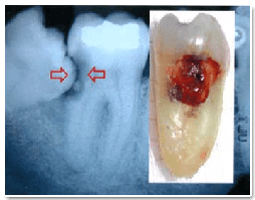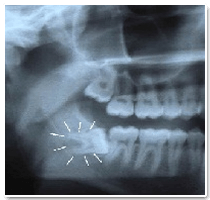
A tooth must be extracted if;
- It harms adjacent teeth (resulting in decayed or crooked teeth),
- It creates focal infection or frequently causes swelling and hardening of maxillary lymph nodes,
- It frequently causes gingivitis and trismus (narrowing down of mouth opening due to muscle spasm),
- It requires orthodontic therapy,
- It requires prosthetic intervention,
- It causes or contributes to pathological formations such as cyst and tumor,
- It causes pain with unknown etiology,
- It prevents osseous healing due to being on the fracture line in case of fractured jaws.
Fully impacted teeth usually do not cause trouble; however, they need to be followed up with routine radiological examination. It may sometimes harm root of the fore teeth or apply pressure on other teeth resulting in crooked teeth. It is also probable that follicle beside teeth that remain impacted for long turns into cyst.


Semi impacted teeth are the most frequent cause of problems. Gingival, also called hood/ kapişon, covers some part of the teeth, and forms a pocket in which food remains accumulate. It leads growth and settling of germs in turn. Consequently, the gingival becomes infected and causes pain as well as swelling. Taking antibiotic and painkiller pills suppresses the problem only temporarily; therefore, it is essential to resolve the problem, in other words, to pull out the tooth.
Erupted wisdom teeth generally bring about difficulty of cleaning because they are located in the back. As they are not brushed well, they become susceptible to decays in the long run. They also often cause cheek biting as they are very far again. Biting of mucous must be prevented before it leads a pathological soft tissue problem, and it must be pulled out.